Nationally, Medicaid covers more than one in five people. The same is true in Connecticut, where more than 900,000 people get their health coverage through HUSKY, including more than 366,000 children. Medicaid covers people at all stages of life; 38% of births in the state are paid for by Medicaid, and Medicaid is the biggest payer of nursing home care and other long-term care for seniors and people with disabilities.
Medicaid in CT
Medicaid is a critical source of health care coverage. In Connecticut, it's known as HUSKY.
What is Medicaid?
Medicaid provides health care coverage for low-income residents. It is administered by each state under federal rules and serves as a critical safety net for one in five U.S. residents. The federal government pays more than half of the state’s Medicaid costs. Medicaid is separate from Medicare, which covers seniors and people with disabilities.
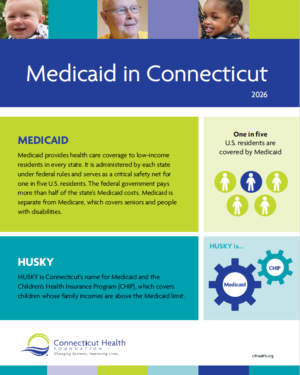
Fact sheet
Medicaid in CT
A brief overview of HUSKY, with details on who is covered, different parts of the program, costs, and outcomes.
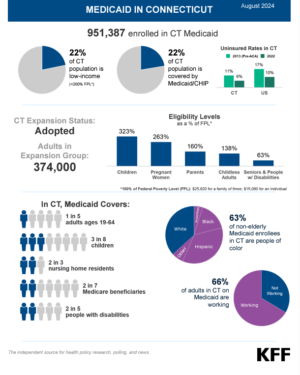
Fact sheet
Medicaid in CT (KFF)
This fact sheet from KFF includes key data points on topics including enrollment, eligibility, and public opinion.
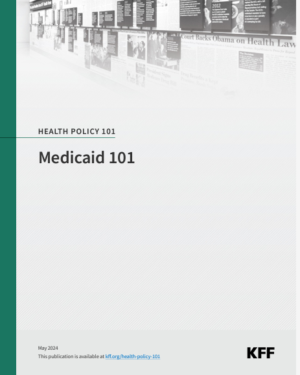
Report
Medicaid 101
This is a chapter of KFF's Health Policy 101, and provides a comprehensive overview of Medicaid in the U.S.
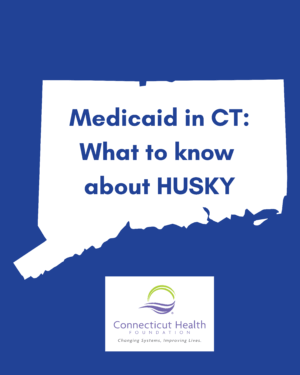
Presentation
Medicaid 101 presentation
Read or download a presentation on the basics of Medicaid in CT (slides available in English and Spanish).
Who does Medicaid cover?
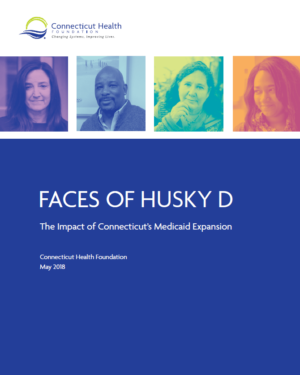
Report
Faces of HUSKY D
Profiles of individuals covered by Medicaid and data on the impact of the coverage for low-income adults without minor children.
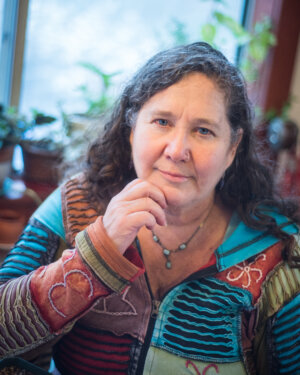
Stories
That's Medicaid
That's Medicaid shares stories, in pictures and videos, of people affected by Medicaid at critical points in their lives.

Blog post
Medicaid: What’s at stake? The Medicaid expansion
This blog post explains what the Medicaid expansion is and who is covered by it.
What effects does Medicaid have on health?
Research has linked Medicaid coverage to a wide range of long-term health and economic benefits. For example, research has linked coverage of children to better overall health in adulthood, as well as outcomes including reduced obesity, fewer hospitalizations, lower rates of disability, and reduced mortality.
Additional research has linked Medicaid coverage of low-income adults to improved access to medical care, better behavioral health outcomes, and catching cancer earlier.
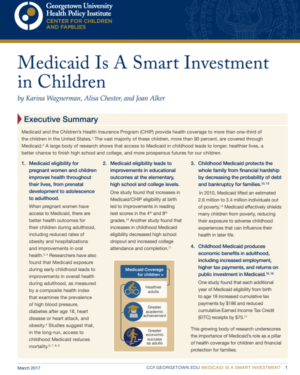
Brief
Medicaid is a Smart Investment in Children
This policy brief from the Georgetown Center for Children and Families summarizes research on the effects of Medicaid coverage for children and pregnant women, focusing on health and educational outcomes and economic security.
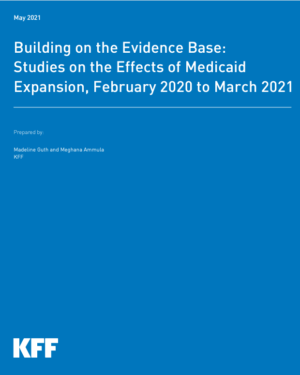
Report
Building on the Evidence Base: Studies on the Effects of Medicaid Expansion
This literature review of nearly 200 studies examines the effects of Medicaid coverage of low-income adults on outcomes including mortality, cancer, chronic disease and disabilities, behavioral health, disparities, economics, and other topics.
What effects does Medicaid have on economic outcomes?
Medicaid shields members from out-of-pocket costs and reduces their likelihood of experiencing medical debt or other financial hardships from health care costs.
Research has linked Medicaid coverage in childhood to increased likelihood of attending college, lower rates of teen parenthood, higher wages, paying more taxes, and lower use of government assistance.
A recent study looked at the long-term outcomes from one of the earliest expansions of coverage to undocumented residents. In 1988, California made prenatal Medicaid coverage available to undocumented residents. This 2022 study examined the long-term outcomes of this policy, and found that children born to undocumented mothers after this policy went into effect had better birth outcomes. They were more likely to attend and graduate from college and were less likely to rely on government assistance programs as adults. The study authors calculated that “over the long-run, the government more than recoups its initial investment.”

Video
Medicaid Has a Huge Return on Investment
In this video from Healthcare Triage, Dr. Aaron E. Carroll describes the findings from research on the positive health and economic effects of Medicaid, including improved health outcomes and financial security.
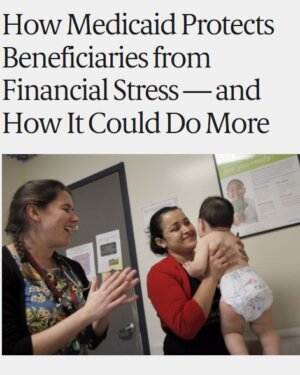
Blog post
How Medicaid Protects Beneficiaries from Financial Stress — and How It Could Do More
This article from The Commonwealth Fund summarizes research findings on how Medicaid can protect people’s financial health. It notes that policymakers can do more to reduce financial hardships for low-income residents.

Blog post
Medicaid: What’s at stake? Economic outcomes
This blog post explores the significant economic benefits of Medicaid for those covered by the program, the providers who treat them, and communities and states as a whole.
Upcoming changes to Medicaid
The federal reconciliation law, known as HR1 or the “big beautiful bill,” made a lot of changes to Medicaid that will take effect in the coming years. These resources explain what will change, who will be affected, and when the changes will happen.

Blog post
The federal bill and Medicaid: What happens now?
This timeline provides an overview of what changes are coming to Medicaid, who will be affected, and when.
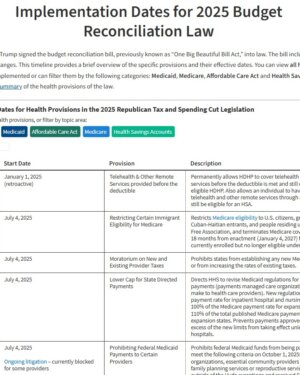
Timeline
Implementation Dates for 2025 Budget Reconciliation Law
This interactive timeline from KFF provides details on changes to Medicaid, Medicare, the Affordable Care Act, and health savings accounts.
Work requirements in Medicaid
The topic of requiring certain Medicaid clients to work as a condition of health care coverage has got a lot of attention in recent years. Research shows that most adults covered by Medicaid already work or have a disability, or are ill, in school, or taking care of someone else. In states that have implemented work requirements for Medicaid, many eligible adults have lost coverage or not gotten covered, and millions of dollars have gone to administrative and consulting costs.
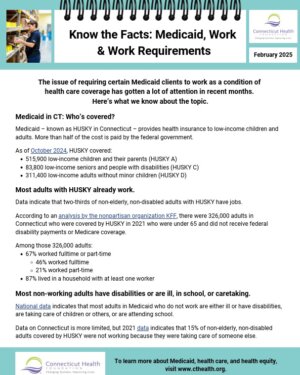
Fact sheet
Medicaid, Work, and Work Requirements
This fact sheet summarizes data on Medicaid and work in Connecticut, as well as experiences of states that have implemented work requirements for Medicaid.
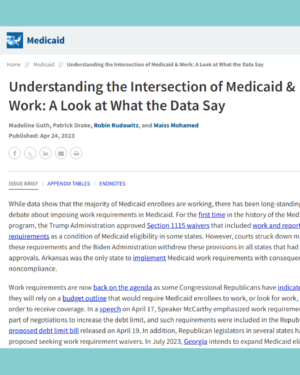
Report
Understanding the Intersection of Medicaid & Work
This report provides context on the national debate on Medicaid work requirements and data on the work status of adults with Medicaid and the impact of work requirements.

Blog post
Medicaid: What’s at stake? Part 1: Work Requirements
This blog post outlines what would be at stake if Congress were to implement work requirements for certain people covered by Medicaid.
Topic Guides
Looking for coverage?
-
See if you qualify for Medicaid (HUSKY)
See if you qualify -
Apply for Medicaid (HUSKY)
Apply here -
Apply for coverage through Access Health CT
Apply here